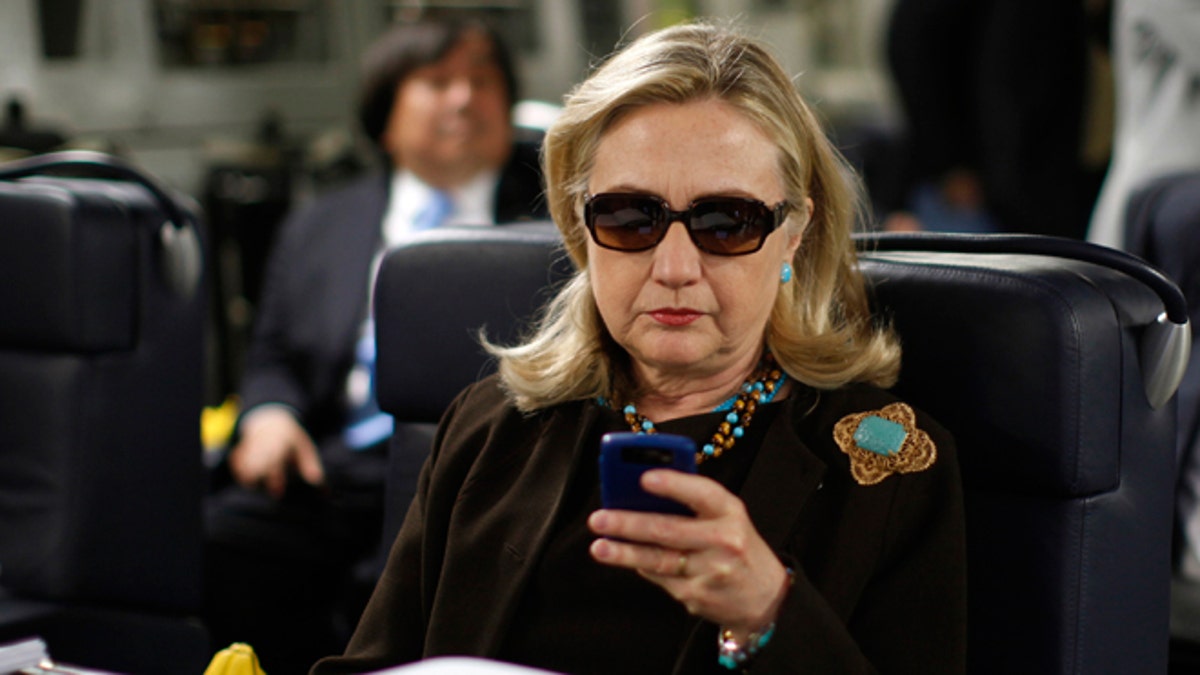
FILE - Oct. 18, 2011: Then-Secretary of State Hillary Rodham Clinton checks her Blackberry from a desk inside a C-17 military plane upon her departure from Malta, in the Mediterranean Sea, bound for Tripoli, Libya. (AP Photo/Kevin Lamarque, Pool)
In the White House’s 2015 National Security Strategy, President Obama tells Americans that the U.S. is leading the way in shaping global standards for cybersecurity, taking on an organizing role in international negotiations and modeling for other nations how they should respond to this serious threat.
However, it is hard to reconcile these claims with the revelations today that during her tenure as President Obama’s Secretary of State, Hillary Clinton conducted all of her vital national security discussions over what is widely acknowledged to be the least secure form of electronic communication, commercial emails sent by smartphone and tablet devices.
Hillary Clinton’s decision to use personal email to conduct classified discussions about issues affecting national security suggests an appalling lack of knowledge regarding cyber threat and cyber vulnerability.
A 2014 report on cyber threat defense issued by the Cyberedge Group tells us that employees who exhibit low security awareness pose the greatest threat to corporations and entities conducting cyberdefense today.
Hillary Clinton’s decision to use personal email to conduct classified discussions about issues affecting national security suggests an appalling lack of knowledge regarding cyber threat and cyber vulnerability.
Constitutional issues aside, Hillary Clinton’s decision to use personal email to conduct classified discussions about issues affecting national security suggests an appalling lack of knowledge regarding cyber threat and cyber vulnerability.
If elected president, Hillary Clinton would be commander in chief of the Armed Forces, which includes the U.S. Cyber Command. She would be the final authority in making decisions related to U.S. cyber-vulnerabilities, including the erection of cyber defenses, the creation of new cyber doctrines and the declaration and conduct of cyberwar.
It should be noted that former Secretary of State Clinton is not alone in exhibiting a low level of security awareness.
A 2013 statement by Elena Kagan suggests that many Supreme Court justices do not actually use email nor personally engage in arenas like social media.
Many American are more cavalier in their use of these technologies than they should perhaps be – as recent leaks of personal information in the Sony cyberhacking scandal earlier this year revealed.
In the documents which declared October 2014 to be National Cybersecurity Awareness Month, the White House noted that cybersecurity was a shared responsibility which all Americans needed to commit to.
All Americans were tasked with knowing about cybersecurity and engaging in protocols to secure their data and digital persons. It seems disingenuous to suggest that all Americans should do something which our own elected public officials are unwilling to do.
The White House’s foreign policy on cyber security notes that the United States has a digital foreign policy which rests on five priorities, one of which is securing federal networks. Hillary Clinton’s failure to utilize these secured federal networks directly contradicts that digital foreign policy. It suggests an attitude of ‘do as I say and not as I do’ -- a poor model for someone who wants to be president.
It is likely that most of the public conversation about the recent revelations will focus on the legal issues which arise regarding whether or not the emails in question were personal or government communications. However, in a dangerous world where the cyberthreat is real, it only makes sense to ask if Hillary Clinton is the person we want in charge of our armed forces including the U.S. Cyber Command.
